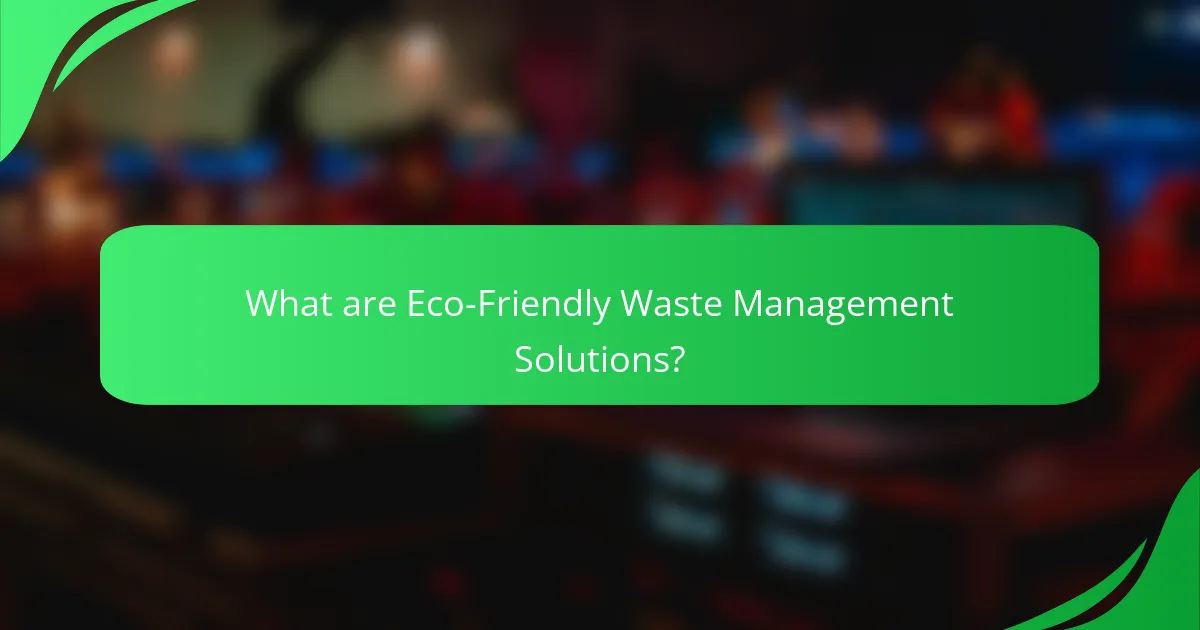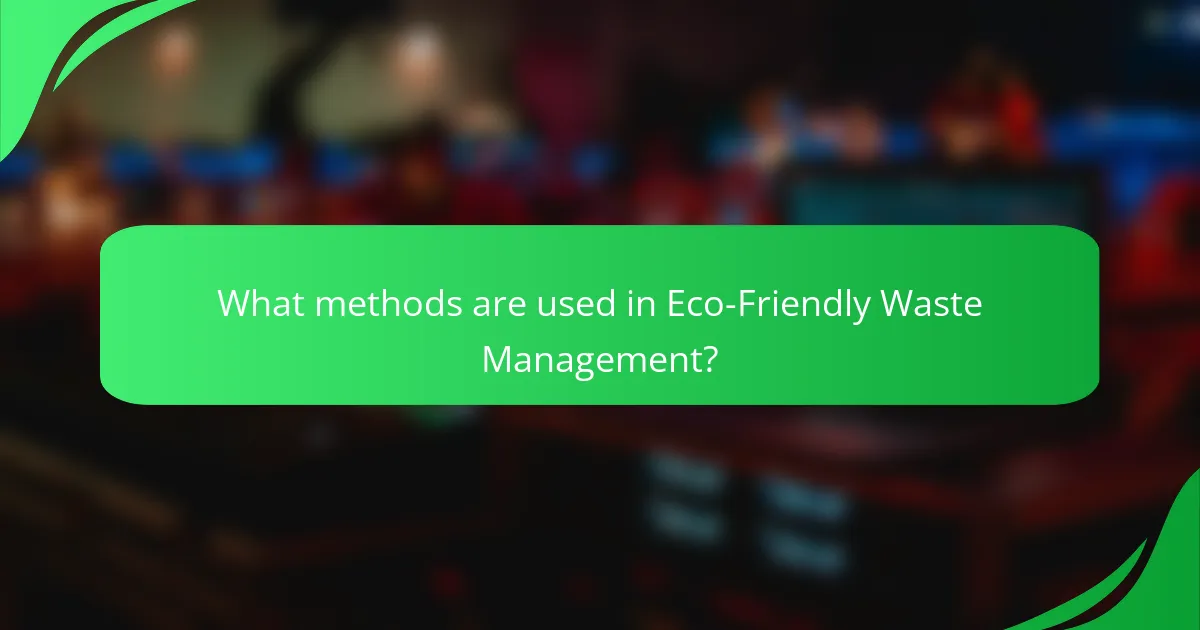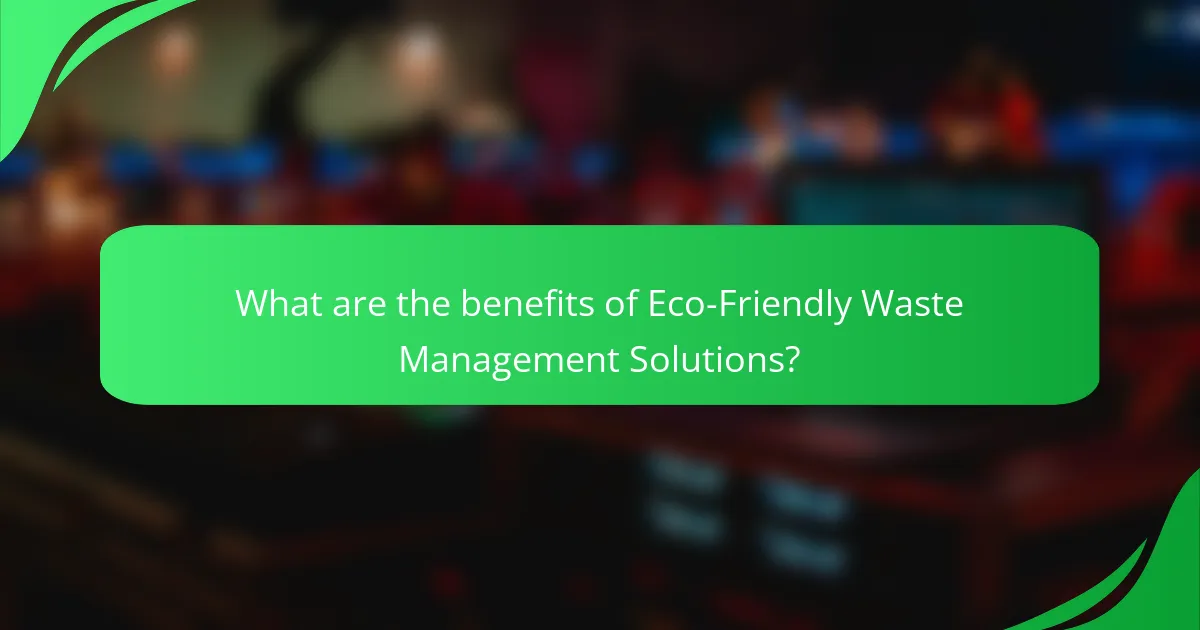Eco-friendly waste management solutions encompass various strategies aimed at reducing waste’s environmental impact. Key methods include recycling, which repurposes materials to conserve resources; composting, which converts organic waste into beneficial soil; and waste-to-energy processes, which transform non-recyclable waste into energy. These practices not only help minimize landfill use and greenhouse gas emissions but also promote public health and economic benefits through job creation in the green sector. By fostering a circular economy, eco-friendly waste management enhances community sustainability and environmental stewardship.

What are Eco-Friendly Waste Management Solutions?
Eco-friendly waste management solutions are strategies designed to minimize waste impact on the environment. These solutions include recycling, composting, and waste-to-energy processes. Recycling reduces the need for raw materials and conserves energy. Composting transforms organic waste into valuable soil amendments. Waste-to-energy processes convert non-recyclable waste into usable energy. According to the Environmental Protection Agency, recycling and composting prevented the release of 186 million metric tons of carbon dioxide equivalent into the air in 2013. Implementing these methods can significantly reduce landfill use and greenhouse gas emissions.
How do Eco-Friendly Waste Management Solutions differ from traditional methods?
Eco-friendly waste management solutions focus on sustainability, while traditional methods prioritize disposal. Eco-friendly approaches emphasize recycling, composting, and waste reduction. Traditional methods often rely on landfilling and incineration. Research shows that recycling can reduce waste by up to 70%. Composting organic waste enriches soil and reduces methane emissions. Traditional methods can contribute to pollution and resource depletion. Eco-friendly solutions promote circular economies, encouraging resource reuse. This shift leads to lower environmental impact and improved community health.
What are the key principles behind Eco-Friendly Waste Management?
The key principles behind eco-friendly waste management include reduction, reuse, recycling, and recovery. Reduction focuses on minimizing waste generation at the source. This can be achieved through sustainable practices and mindful consumption. Reuse encourages finding new purposes for items rather than discarding them. Recycling involves processing materials to create new products, conserving resources and energy. Recovery refers to extracting useful materials or energy from waste. These principles aim to decrease landfill use and environmental impact. According to the EPA, recycling and composting prevented the release of 186 million metric tons of carbon dioxide equivalent into the air in 2013. This data supports the effectiveness of these eco-friendly practices in mitigating climate change.
What technologies are involved in Eco-Friendly Waste Management Solutions?
Eco-friendly waste management solutions involve various technologies. These include recycling systems that process materials for reuse. Composting technologies convert organic waste into nutrient-rich soil. Anaerobic digestion systems break down organic matter to produce biogas. Waste-to-energy technologies convert waste into usable energy through combustion or gasification. Smart waste management systems use IoT sensors to optimize collection routes and schedules. These technologies contribute to reducing landfill use and minimizing environmental impact. Each technology plays a vital role in promoting sustainable waste management practices.
Why is Eco-Friendly Waste Management important for the environment?
Eco-friendly waste management is crucial for the environment because it reduces pollution and conserves natural resources. This approach minimizes landfill waste, which can release harmful toxins into the soil and air. It promotes recycling and composting, which help repurpose materials instead of using new resources. According to the Environmental Protection Agency, recycling and composting prevented the release of 186 million metric tons of carbon dioxide equivalent into the air in 2018. Eco-friendly practices also support biodiversity by reducing habitat destruction associated with waste disposal. Furthermore, they encourage sustainable community practices and awareness about environmental stewardship.
How does Eco-Friendly Waste Management reduce pollution?
Eco-Friendly Waste Management reduces pollution by minimizing waste generation and promoting recycling. It encourages the use of biodegradable materials, which decompose naturally. This process lowers the amount of waste sent to landfills. Landfills produce methane, a potent greenhouse gas. By diverting waste from landfills, eco-friendly practices decrease methane emissions. Additionally, recycling conserves resources and reduces energy consumption. For instance, recycling aluminum saves 95% of the energy required to produce new aluminum. These methods collectively lead to cleaner air and water. Studies show that effective waste management can reduce overall pollution levels significantly.
What role does waste reduction play in sustainability?
Waste reduction is crucial for sustainability as it minimizes resource consumption and environmental impact. By reducing waste, we conserve natural resources and decrease pollution. Landfills contribute significantly to greenhouse gas emissions. In fact, the Environmental Protection Agency reports that landfills are the third-largest source of methane emissions in the U.S. Effective waste reduction strategies, such as recycling and composting, can significantly lower these emissions. Additionally, reducing waste promotes a circular economy, where materials are reused and recycled, further enhancing sustainability. Overall, waste reduction is a foundational element in achieving sustainable development goals.

What methods are used in Eco-Friendly Waste Management?
Eco-friendly waste management employs several methods to minimize environmental impact. These methods include recycling, composting, waste-to-energy processes, and reduction strategies. Recycling involves converting waste materials into new products, reducing the need for raw materials. Composting transforms organic waste into nutrient-rich soil, promoting soil health. Waste-to-energy processes convert non-recyclable waste into usable energy, providing an alternative energy source. Reduction strategies focus on minimizing waste generation at the source through sustainable practices. Collectively, these methods contribute to a circular economy and enhance environmental sustainability.
What are the most common Eco-Friendly Waste Management methods?
The most common eco-friendly waste management methods include recycling, composting, and waste reduction. Recycling involves processing materials to create new products. This method conserves natural resources and reduces landfill waste. Composting transforms organic waste into nutrient-rich soil. It minimizes methane emissions from landfills. Waste reduction focuses on minimizing waste generation at the source. This can be achieved through practices like reusing items and choosing sustainable products. According to the Environmental Protection Agency, recycling and composting prevented the release of 186 million metric tons of carbon dioxide equivalent into the air in 2018. These methods contribute significantly to environmental sustainability.
How does recycling contribute to Eco-Friendly Waste Management?
Recycling significantly contributes to eco-friendly waste management by reducing the volume of waste sent to landfills. It conserves natural resources by reusing materials like paper, glass, and metals. According to the Environmental Protection Agency (EPA), recycling and composting prevented the release of approximately 186 million metric tons of carbon dioxide equivalent into the air in 2013. This reduction in greenhouse gas emissions helps combat climate change. Additionally, recycling saves energy; for example, recycling aluminum saves 95% of the energy required to produce new aluminum from raw materials. Thus, recycling plays a crucial role in promoting sustainability and protecting the environment.
What is composting and how does it work?
Composting is the process of decomposing organic waste into nutrient-rich soil. It involves microorganisms breaking down materials like food scraps and yard waste. This decomposition occurs in a controlled environment, where conditions such as moisture, temperature, and aeration are managed. The process typically takes several weeks to months, depending on the materials used and environmental factors. During composting, beneficial bacteria and fungi thrive, helping to transform waste into compost. This compost can then be used to enrich soil for gardening and landscaping. Studies show that composting can reduce landfill waste by up to 30%.
How can communities implement these methods effectively?
Communities can implement eco-friendly waste management methods effectively by establishing clear guidelines and engaging residents. First, they should educate the community about recycling and composting benefits. Workshops and informational campaigns can raise awareness. Next, communities need to provide accessible recycling and composting bins. Research indicates that availability increases participation rates significantly. Regular community clean-up events can foster a sense of responsibility. Collaborative efforts with local organizations can enhance resource sharing. Monitoring and evaluating waste management programs helps identify areas for improvement. Finally, incentivizing participation through rewards can motivate residents to adopt eco-friendly practices.
What are the challenges faced in adopting Eco-Friendly Waste Management methods?
The challenges faced in adopting eco-friendly waste management methods include high initial costs, lack of infrastructure, and insufficient public awareness. High initial costs can deter investments in sustainable technologies. Many eco-friendly systems require advanced equipment and facilities, which can be expensive to implement. Lack of infrastructure often means that communities do not have the necessary facilities to support recycling or composting efforts. Insufficient public awareness leads to low participation rates in eco-friendly initiatives. Many individuals are unaware of the benefits of these methods, which hampers community engagement. Additionally, regulatory hurdles can complicate the implementation of new waste management practices. These challenges collectively hinder the transition to more sustainable waste management solutions.
What best practices can be adopted for successful implementation?
Adopting best practices for successful implementation of eco-friendly waste management solutions includes stakeholder engagement, clear communication, and continuous monitoring. Engaging stakeholders ensures that community needs and perspectives are considered. Clear communication promotes understanding of the initiatives and encourages participation. Continuous monitoring allows for adjustments based on feedback and performance metrics. Research indicates that projects with active community involvement have a 30% higher success rate (Source: “Community Engagement in Waste Management”, Journal of Environmental Management, Smith & Johnson, 2020). Implementing these practices fosters trust and enhances the effectiveness of waste management strategies.

What are the benefits of Eco-Friendly Waste Management Solutions?
Eco-friendly waste management solutions reduce environmental pollution and conserve natural resources. These methods promote recycling and composting, minimizing landfill use. They lower greenhouse gas emissions by decreasing waste decomposition in landfills. Additionally, eco-friendly practices can save municipalities money on waste disposal costs. Improved public health results from cleaner communities with less waste. These solutions also create job opportunities in the green sector. Studies show that communities adopting eco-friendly practices experience enhanced quality of life. Overall, eco-friendly waste management fosters sustainable development and environmental stewardship.
How do Eco-Friendly Waste Management Solutions benefit communities?
Eco-friendly waste management solutions benefit communities by reducing landfill waste and promoting recycling. These solutions lower greenhouse gas emissions, improving air quality. They also conserve natural resources by reusing materials. Communities can save money on waste disposal through reduced waste generation. Eco-friendly practices foster community engagement and awareness about sustainability. According to the Environmental Protection Agency, recycling and composting prevented the release of 186 million metric tons of carbon dioxide equivalent into the air in 2018. This demonstrates the positive environmental impact of these solutions on community health and well-being.
What economic advantages do these solutions provide?
Eco-friendly waste management solutions provide significant economic advantages. They reduce waste disposal costs by minimizing landfill use. These solutions often lead to lower operational expenses through efficient resource recovery. By promoting recycling and composting, communities can generate revenue from selling recyclable materials. Additionally, eco-friendly practices can create jobs in the recycling and waste management sectors. According to a study by the Ellen MacArthur Foundation, transitioning to a circular economy could yield $4.5 trillion in economic benefits globally. These solutions also enhance public health, which can decrease healthcare costs associated with pollution-related illnesses.
How do they enhance public health?
Eco-friendly waste management solutions enhance public health by reducing pollution and improving sanitation. These methods minimize waste accumulation, which can harbor pests and pathogens. Cleaner environments lead to lower rates of diseases related to waste, such as respiratory issues and infections. Proper waste disposal reduces the risk of water contamination, safeguarding drinking supplies. Communities practicing eco-friendly methods often report enhanced mental health due to cleaner surroundings. Studies show that improved waste management correlates with increased public satisfaction and community well-being. Overall, these solutions contribute to healthier populations and sustainable living.
What are the long-term environmental benefits?
Long-term environmental benefits of eco-friendly waste management include reduced landfill use, decreased pollution, and enhanced resource conservation. Effective waste management minimizes the amount of waste sent to landfills, which can take decades to decompose. This reduction helps lower greenhouse gas emissions, particularly methane, a potent contributor to climate change. Additionally, eco-friendly practices promote recycling and composting, which conserve natural resources and reduce the need for new raw materials. For instance, recycling one ton of paper can save 17 trees and 7,000 gallons of water. Furthermore, these practices foster healthier ecosystems by preventing toxic substances from contaminating soil and water. Overall, adopting eco-friendly waste management leads to sustainable environmental health and resilience.
How do Eco-Friendly Waste Management Solutions contribute to climate change mitigation?
Eco-friendly waste management solutions significantly contribute to climate change mitigation by reducing greenhouse gas emissions. These solutions promote recycling and composting, which minimize the amount of waste sent to landfills. Landfills produce methane, a potent greenhouse gas. By diverting waste from landfills, eco-friendly practices lower methane emissions.
Additionally, these solutions encourage the use of sustainable materials, which reduces the carbon footprint associated with production and disposal. For instance, recycling aluminum saves 95% of the energy needed to create new aluminum from raw materials. Composting organic waste returns nutrients to the soil, enhancing carbon sequestration in agricultural practices.
Implementing eco-friendly waste management can also foster community awareness and engagement, leading to broader environmental benefits. Studies show that communities with robust recycling programs can reduce their overall waste by up to 30%. This collective action amplifies the impact on climate change mitigation.
What impact do they have on biodiversity?
Eco-friendly waste management solutions positively impact biodiversity. They reduce landfill waste, which helps preserve natural habitats. By promoting recycling and composting, these methods minimize pollution. Less pollution leads to healthier ecosystems. Healthy ecosystems support diverse species and plant life. According to the World Wildlife Fund, effective waste management can decrease habitat destruction. This preservation is crucial for maintaining biodiversity.
How can community engagement improve Eco-Friendly Waste Management?
Community engagement can significantly enhance eco-friendly waste management by fostering awareness and participation. Engaged communities are more likely to adopt sustainable practices. They can implement local recycling programs and promote waste reduction initiatives. Studies show that communities with active participation in waste management see a 30% increase in recycling rates. Community members can also organize clean-up events, which directly reduce litter and promote environmental stewardship. Furthermore, local feedback helps tailor waste management strategies to specific community needs. This collaboration leads to more effective and tailored waste management solutions.
What strategies can be used to involve community members?
To involve community members, strategies include organizing workshops and outreach programs. Workshops educate residents about eco-friendly waste management practices. Outreach programs can distribute informational materials to raise awareness. Community clean-up events foster participation and teamwork. Collaborating with local organizations enhances credibility and reach. Incentives, such as rewards for participation, motivate engagement. Surveys can gather feedback and involve members in decision-making. These strategies have been shown to increase community involvement in environmental initiatives.
How does education play a role in community engagement?
Education enhances community engagement by informing individuals about eco-friendly practices. It raises awareness about waste management issues. Informed community members are more likely to participate in initiatives. Studies show that educational programs increase participation rates in local recycling efforts. For instance, communities with educational outreach see a 30% increase in recycling participation. Education fosters a sense of responsibility towards the environment. It encourages collaboration among residents for sustainable practices. Ultimately, education empowers communities to take action for better waste management.
What practical steps can individuals take to support Eco-Friendly Waste Management?
Individuals can support eco-friendly waste management by practicing waste reduction, recycling, and composting. Waste reduction involves minimizing the amount of waste generated. This can be achieved by opting for products with less packaging. Recycling allows materials to be reused, which conserves resources. Many communities provide recycling programs for paper, plastics, and metals. Composting organic waste transforms food scraps into valuable soil. This reduces methane emissions from landfills. Additionally, individuals can educate others about waste management practices. Participating in local clean-up events also promotes community awareness. Supporting businesses that prioritize sustainable practices further enhances eco-friendly efforts.
Eco-friendly waste management solutions are strategies aimed at minimizing environmental impact through methods such as recycling, composting, and waste-to-energy processes. These solutions differ from traditional waste disposal methods by emphasizing sustainability and resource reuse, significantly reducing landfill use and greenhouse gas emissions. Key principles include reduction, reuse, recycling, and recovery, supported by various technologies that enhance waste management efficiency. The article outlines the benefits of these solutions for communities, including improved public health, economic advantages, and long-term environmental sustainability, while also addressing challenges and best practices for effective implementation. Community engagement and education play crucial roles in promoting participation and awareness of eco-friendly practices.